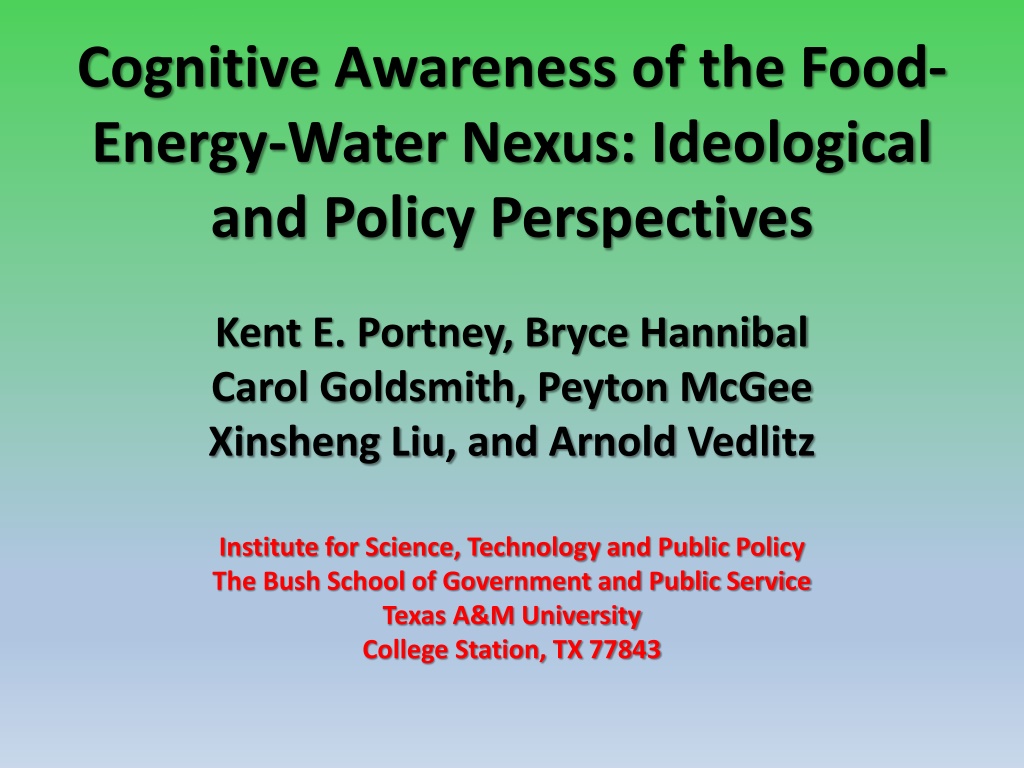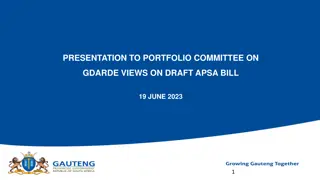
Awareness of the Food-Energy-Water Nexus Perspectives
Explore the cognitive awareness of the food-energy-water nexus from ideological and policy perspectives. Learn about nexus scholarship, social science angles, and public awareness surveys on the interconnected issues of food, energy, and water resources.
Download Presentation

Please find below an Image/Link to download the presentation.
The content on the website is provided AS IS for your information and personal use only. It may not be sold, licensed, or shared on other websites without obtaining consent from the author. If you encounter any issues during the download, it is possible that the publisher has removed the file from their server.
You are allowed to download the files provided on this website for personal or commercial use, subject to the condition that they are used lawfully. All files are the property of their respective owners.
The content on the website is provided AS IS for your information and personal use only. It may not be sold, licensed, or shared on other websites without obtaining consent from the author.
E N D
Presentation Transcript
Cognitive Awareness of the Food- Energy-Water Nexus: Ideological and Policy Perspectives Kent E. Portney, Bryce Hannibal Carol Goldsmith, Peyton McGee Xinsheng Liu, and Arnold Vedlitz Institute for Science, Technology and Public Policy The Bush School of Government and Public Service Texas A&M University College Station, TX 77843
The Idea Behind Nexus Source: Water Security and the Global Water Agenda. A UN-Water Analytical Brief. United Nations University, 2013, p. 14.
Nexus Scholarship Most research centers on science and engineering questions Documenting Tradeoffs How much water does it take to generate electricity? How much water does it take to extract natural gas through hydraulic fracturing? How much energy does it take to grow a certain amount of food? How much corn (and water) does it take to make a gallon of ethanol fuel? Can the tradeoff be mitigated?
The Social Science Side Social scientists and policy researchers have not paid much attention to nexus issues Economists analyze efficiency what allocation is optimal for the economy? Embedded in Nexus are a wide array of questions and issues that involve social and behavioral sciences, and are directly relevant to policies This paper focuses on one area investigating whether there is any cognitive awareness of the nexus among the general public If there is, who has this awareness, and what difference does it make in terms of policy support?
Measuring Public Awareness of the Nexus The National Water-Energy-Food Nexus Public Opinion Survey, 2015 Conducted by GfK using its KnowledgePanel 1,463 respondents Questions designed to elicit information about specific connections
Awareness of the Water-Energy Nexus Sixteen questions. Examples: Using hydraulic fracturing to remove natural gas from the ground uses significant amounts of water. Periods of drought can mean that an individual power plant cannot make as much electricity. Some ways of generating electricity may be harmful to water supplies because they use significant amounts of water or create water pollution. How harmful to water supplies do you think each of these electrical power sources is?
Awareness of the Water-Food Nexus Eight questions. Examples: How concerned are you about each of the following issues related to agricultural production? The ability of food crops to tolerate drought. The amount of water pollution from herbicides, pesticides, and fertilizers used in food production. The amount of water used to produce the food. Water pollution caused by farms.
Awareness of the Energy-Food Nexus Five Questions. Examples: Decide if each of these statements is true or false: Corn used as ethanol fuel is the source of 10-15% of the energy consumed in the U.S. Corn used as ethanol fuel gives cars better gas mileage than gasoline
The Awareness Indexes Three Nexus Awareness Indexes created Each measures the extent to which each person seems to be aware of the Nexus Counts the number of nexus answers as a percentage of all nexus questions answered
Awareness Index Correlations Water-Energy Nexus Awareness Index .253*** .506*** Energy-Food Nexus Awareness Index Water-Food Nexus Awareness Index .433*** *** p < 0.001
Policy Support Variables Policies that would decrease the nexus We should Have more monitoring of groundwater before and after hydraulic fracturing Require low water-use landscaping to better manage water resources Charge higher energy rates for high- volume users to better manage energy
Hypotheses We expect that people who have greater awareness of each nexus to be more supportive of policy interventions than people who have less awareness Awareness of each of type of nexus might be related to policy support differently depending on whether the policy is designed to affect water, energy, or food and agriculture
Policy Support Dependent Variable: We should have more monitoring of groundwater before and after hydraulic fracturing (n = 1,017) Model 1 Model 2 Model 3 Independent and Control Variables (S.E.) 2.57*** (.119) ------ Beta .557 (S.E.) ------ Beta ------ (S.E.) ------ Beta ------ Water-Energy Nexus Awareness Index Water-Food Nexus Awareness Index Energy-Food Nexus Awareness Index Conservative Political Ideology Female Gender ------ 1.02*** (.118) ------ .255 ------ ------ ------ ------ ------ .461*** (.117) -.166*** (.017) .005 (.054) .006*** (.002) .065** (.024) -.013 (.009) .175*** (.065) 4.16*** (.152) .117 -.089*** (.015) -.075 (.045) .006*** (.001) .047* (.020) -.001 (.008) .224*** (.054) 2.43*** (.146) -.115 -.014*** (.017) .010 (.052) .005** (.002) .054* (.024) -.013 (.009) .219*** (.063) 3.66*** (.159) -.249 -.291 -.042 .117 .006 .002 Age .091 .108 .087 Years of Education .063 .072 Household Income -.002 -.044 -.047 White non-Hispanic Race/Ethnicity Constant .105 .103 .082 ------ ------ ------ Adjusted R2 .390 .170 .122
Policy Support Dependent Variable: Require low water-use landscaping to better manage water resources (n = 1,380) Model 1 Model 2 (S.E.) Beta (S.E.) 1.38*** (.119) ------ ------ 0.985*** (.101) ------ ------ ------ Model 3 (S.E.) ------ Independent and Control Variables Water-Energy Nexus Awareness Index Water-Food Nexus Awareness Index Energy-Food Nexus Awareness Index Conservative Political Ideology Female Gender Beta ------ Beta ------ .299 ------ .252 ------ ------ ------ .298*** (.104) .075 -.074*** (.016) .053 (.046) .006*** (.001) .066** (.021) .008 (.008) -.073 (.053) 2.41*** (.143) -.123 -.085*** (.016) .090 (.047) .004** (.001) .064** (.021) .004 (.008) -.062 (.054) 2.72*** (.135) -.143 -.109*** -.182 (.016) .103 (.048) .006*** (.001) .072** (.022) .006 (.008) -.099 (.055) 3.24*** (.133) .029 .049 .056 Age .111 .084 .107 Years of Education .087 .085 .095 Household Income .029 .014 .023 White non-Hispanic Race/Ethnicity Constant -.035 -.031 -.049 ------ ------ ------ Adjusted R2 .147 .124 .069
Policy Support Dependent Variable: Charge higher energy rates for high-volume users to better manage energy resources (n = 1,378) Model 1 Model 2 Model 3 Independent and Control Variables Water-Energy Nexus Awareness Index Water-Food Nexus Awareness Index Energy-Food Nexus Awareness Index Conservative Political Ideology Female Gender (S.E.) 1.35*** (.133) ------ Beta .263 (S.E.) ------ Beta ------ (S.E.) ------ Beta ------ ------ 1.03*** (.112) ------ .238 ------ ------ ------ ------ ------ .444*** (.114) -.136*** (.018) -.081 (.053) .006*** (.002) .067** (.024) .023* (.009) .005 (.061) 3.00*** (.147) .101 -.104*** (.017) -.130* (.052) .006*** (.001) .060* (.024) .025** (.009) .026 (.059) 2.28*** (.159) -.156 -.113*** (.017) -.094 (.052) .005** (.002) .058* (.024) .020* (.009) .040 (.059) 2.54*** (.150) -.171 -.205 -.064 -.046 -.041 Age .108 .084 .103 Years of Education .072 .069 .081 Household Income .077 .063 .073 White non-Hispanic Race/Ethnicity Constant .011 .018 .002 ------ ------ ------ Adjusted R2 .135 .125 .081
Conclusions Those who see connections between water and energy also are likely to see connections between water and food and between food and energy People are less aware of connections between food and energy than connections between water and energy or water and food Awareness of each nexus is related to the policies in all three areas Political ideology is an important element in understanding support for policies that promise to reduce the nexus
A Larger Construct? Raises questions about whether awareness might be part of a larger construct Need to examine connections with knowledge and other aspects of the New Ecological Paradigm Further analysis of political ideology, and whether being conservative really does impede policy efforts to mitigate the nexus and achieve greater water, energy, and food efficiencies Need to conduct analysis of mental modeling to understand a fuller picture of what such a construct might be




